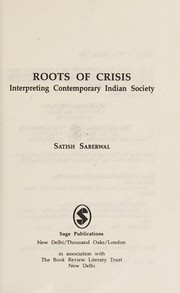Check nearby libraries
Buy this book

Professor Saberwal maintains that though over the last two centuries Indian society has undergone vast enlargements in social and technical scales, most people still continue to identify with numerous, restrictive and varied codes drawn from the 'small' worlds of family, caste and village. It is this mismatch between the wider social processes and personal belief structures which could account for the abrasive and diverse conflicts in present-day Indian society.
Searching for the sources of contemporary political practices in a range of precolonial political regimes, the author argues that the latter were lacking in the kind of general rules and legal codes which assisted state formation in Europe from the twelfth century onwards and helped Europe's global expansion after Columbus.
India's difficulties have been especially acute in the matter of conflict between groups in religious terms. Professor Saberwal offers a seminal and novel analysis of communalism. He maintains that while 'religion' used to be central to the classical cultural traditions, these traditions still continue to shape personal and social identities even among those for whom faith may have lapsed.
This, along with the processes attending on the enlargement of scales, combine to lead to an explanation of the mushrooming and abrasive communal and ethnic conflicts which India is currently witnessing. A semi-autobiographical sketch of the influences which have shaped the author's arguments concludes the study.
- Utilising a unique socio-historical framework which explores interrelationships between indigenous and Western institutions in a comparative perspective, this book will interest students, scholars and professionals in a wide range of disciplines including sociology, political science, anthropology, history and South Asian studies. It will also appeal to the general reader anxious to make sense of his or her own experiences.
Check nearby libraries
Buy this book

Previews available in: English
Showing 2 featured editions. View all 2 editions?
| Edition | Availability |
|---|---|
|
1
Roots of crisis: interpreting contemporary Indian society
1996, Sage Publications
in English
8170365201 9788170365204
|
aaaa
Libraries near you:
WorldCat
|
|
2
Roots of Crisis: Interpreting Contemporary Indian Society
1996, SAGE Publications, Incorporated
in English
0803992866 9780803992863
|
zzzz
Libraries near you:
WorldCat
|
Book Details
Edition Notes
Includes bibliographical references (p. [180]-192) and index.
"In association with the Book Review Literary Trust New Delhi."
Classifications
The Physical Object
ID Numbers
Community Reviews (0)
Feedback?| August 4, 2024 | Edited by MARC Bot | import existing book |
| July 22, 2022 | Edited by ImportBot | import existing book |
| August 4, 2020 | Edited by ImportBot | import existing book |
| February 12, 2010 | Edited by WorkBot | add more information to works |
| December 10, 2009 | Created by WorkBot | add works page |










